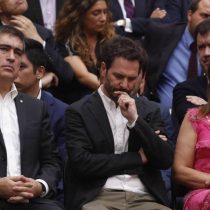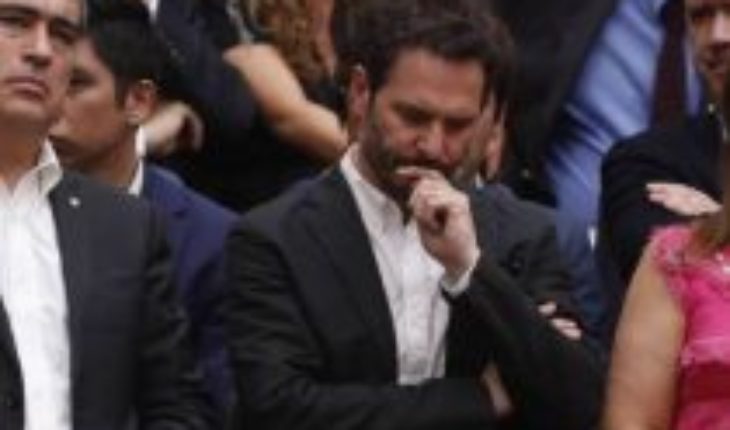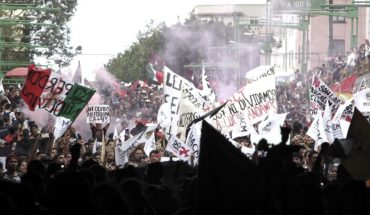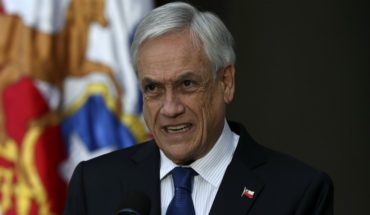
If the ascent to the government dome of Evópoli had already morphed into a headache in the palatial internal, for not respecting the representativeness of the coalition at least in the political committee, the prominent role assumed by the Minister of Finance, Ignacio Briones, deepened the mises coming not only from the two largest parties of the coalition – RN and the UDI -, but also from the conservative world of officialship that he saw as in the hands of the head of the fiscal wallet, d and little by little, they were losing ground.
The determination of the Representative in the midst of the crisis of “softening” the face of La Moneda with the departures of the former Minister of the Interior, Andrés Chadwick, and the arrival in gonzalo Blumel’s wallet, the installation of the Karla Rubilar on the armchair of the Segegob occupied by the current Minister of Sports, Cecilia Pérez, although he obtained the expected result immediately – as recorded in the Government – of lowering the street temperature, ended up being for the daily work a double-edged weapon. In the interior of Chile Vamos they agreed that the emergence of a leadership like that of Minister Briones was one of the main successes of the liberal sector of the conglomerate. The move to break with the institutionalized structure of the Chicago Boys in the Ministry of Finance was recognized as a “bold measure” of the President, Sebastián Piñera, but in the palace they were aware that yes or yes would “bring serious consequences”.
Briones’ statements in taking New Zealand’s political-economic model as a goal to be achieved and his open support for constitutional change – despite the presidential call to stay out – have made his figure one of the ones that awakens the most antibodies on the right. He has come to joke that there are some sectors that “have nightmares” with the rise of the head of the fiscal wallet, which according to his party colleagues has “eclipsed leadership such as that of Felipe Kast and even Minister Blumel”.
The reason for the discomfort among your cluster pairs has two tributaries. On the one hand, the signal that the Mandatario wanted to deliver from where he understands should turn the Chilean right – as several read it in the palace – by placing two Evópoli in the most important ministries such as Interior and Finance. On the other hand, the needless party was assigned a “finger-to-finger” prominence, in the midst of a context of important ideological definitions such as the post-October 18 scenario.
The rise of the party led by Hernán Larraín Matte, took place in the context of a “cold war” between The National Renewal and the UDI, where it competes for the power and control of the right of the country. This, after RN managed in the last parliamentary elections to become the store with the largest number of deputies and in front of its official peers, also of mayors and councillors. relegating udI back to a secondary position.
All this has been whipped up with the reordering of conservative and liberal forces within officialism with a view to the plebiscite of 26 April. Wherever you look at it, “a hostile ground” for evópoli’s medium- and long-term pretensions, he knows that for now he must play neutrality, bow his head and hoard everything he reaches along the way.
It is in the face of this prominence that in the most conservative “team” of the cabinet, figures began to be raised in order to “make weight” of Minister Briones, in whom the representativeness of the liberal space was possessed. Close to the political committee they agreed that a campaign was launched for the Minister of Economy, Lucas Palacios – “who is friendly and close as Briones” – to take greater prominence, recalling the recent campaign through social media #conocetuslucas, where the head of portfolio appears colloquially doing financial education.
The deployment in this case, would be accompanied by his pair of the Segpres, Felipe Ward, both UDI militants, and who would have the task of “empowering” theself in order to set up the most conservative pole in the cabinet, but with a “kinder” look. In any case, there are those who pointed out in the Government that Minister Ward has already “lost a lot of ground, you cannot dress something that is not.”
Continuing the deployment of the conservative pole, the Minister of Education, The Minister of Education, Marcela Cubillos, broke the silence in which she was with an interview in which she declared that she will vote to reject the new Constitution. Nothing new for La Moneda, although this “exit from the constitutional closet” caught the eye even in its own circle, as it had remained in the background given the prominence that had been taken in this issue by her husband, Senator RN, Andrés Allamand. Although both are from different parties, the Government acknowledged that “they are part of the same sector, which was built between the UDI and part of RN”.
The minister, they added, could become the one who assumes a role of spokesperson for this sector within the Government, because she is one of the strongest figures in the cabinet “at the political level” and that can be seen in the management of her agenda, which would be built without the “paute” of the Segegob or Interior, unlike the rest of her peers in the cabinet. Their empowerment in the constitutional discussion would be one of the weapons that would be preparing for this toughest sector of Chile Let’s “take back official control”.
In this space there are also ministers such as Isabel Plá, Alfredo Moreno and Baldo Prokurica, although among their advisors they find it difficult to want to be identified with leaders such as Cubillos. However, they recognized that there is a much more aggressive positioning strategy than that of 2019.
This whole deployment is mediated by a deeper strategy from the two anchor parties of Chile Vamos, RN and the UDI, who respond to their “historical call” seek to become the central parties of the new political cycle, neutralizing other forces in the sector, such as Evópoli. From their benches they recognized that both communities can represent the entire political framework”, which have figures such as the helmsman Mario Desbordes who “can sit down and dialogue with the opposition without problems” and, at the same time, leadership such as that of Allamand and that of the president of the trade union, Jacqueline van Rysselberghe, who represent a sector linked to the most traditional right of the country. “We’re not missing anyone,” they stressed.
Horizontal’s chief executive Sebastian Izquierdo noted that “any kind of movement necessarily generates a change.” Regarding the reordering of forces in the official intern, he added that “I don’t think it has anything to do with a topic of structures, as it is about underlying ideas (…) to be sure, this liberal approach, characterized by dialogue for reforms that allow joint solutions, has opened up a space that allows the plurality of the country to be finally represented and considered”.
Pacts at convenience
With a view to the October elections – of mayors, councillors, chubby people and regional governors – the joint-definition work in officialism is far from successful, the increasingly plausible differences in agreeing on a regulatory decision-making framework are still in a liquid state. Although there are already several months since the teams of the four matches that make up Chile Vamos to approach positions, from the work tables, they ensured that with the return of the experts in March you should start writing on a paper still blank “in real terms”.
In the midst of the internal tension that is experienced in Chile Vamos, close to the work of the different boards, augured a difficult process of negotiation for Evópoli, considering that the positions would be very closed and that several understand that neither RN nor the UDI can yield in this pass, because “hegemony is being played” of the sector within a year of the presidential. Those who know closely the work of the board of Larraín Matte, stated that their bet would be to thicken the bases, that is, bet on the councillors. That would also be understood considering that the Democratic PRI outperforms them in the municipal world.
In this context, centrality would be opted, that is, to maintain “clean lists” in which alliances with “strong independents” are prioritized, rather than enhancing figures of Evópoli.
But the need also has a heretic alseed and there will be specific cases in which in National Renewal would choose to go together to Evópoli, as is the case of the mayor of Viña del Mar, where councillors of that store would have pledged to support the candidacy of Andrea Molina, the former UDI MP who would go in the quota of RN.
At the UDI, despite being aware of this situation, they stated that it is due to a one-off case and that the tonic of the talks has aimed to generate an alliance that favors the two largest parties, although “from March onwards everything can change”.





